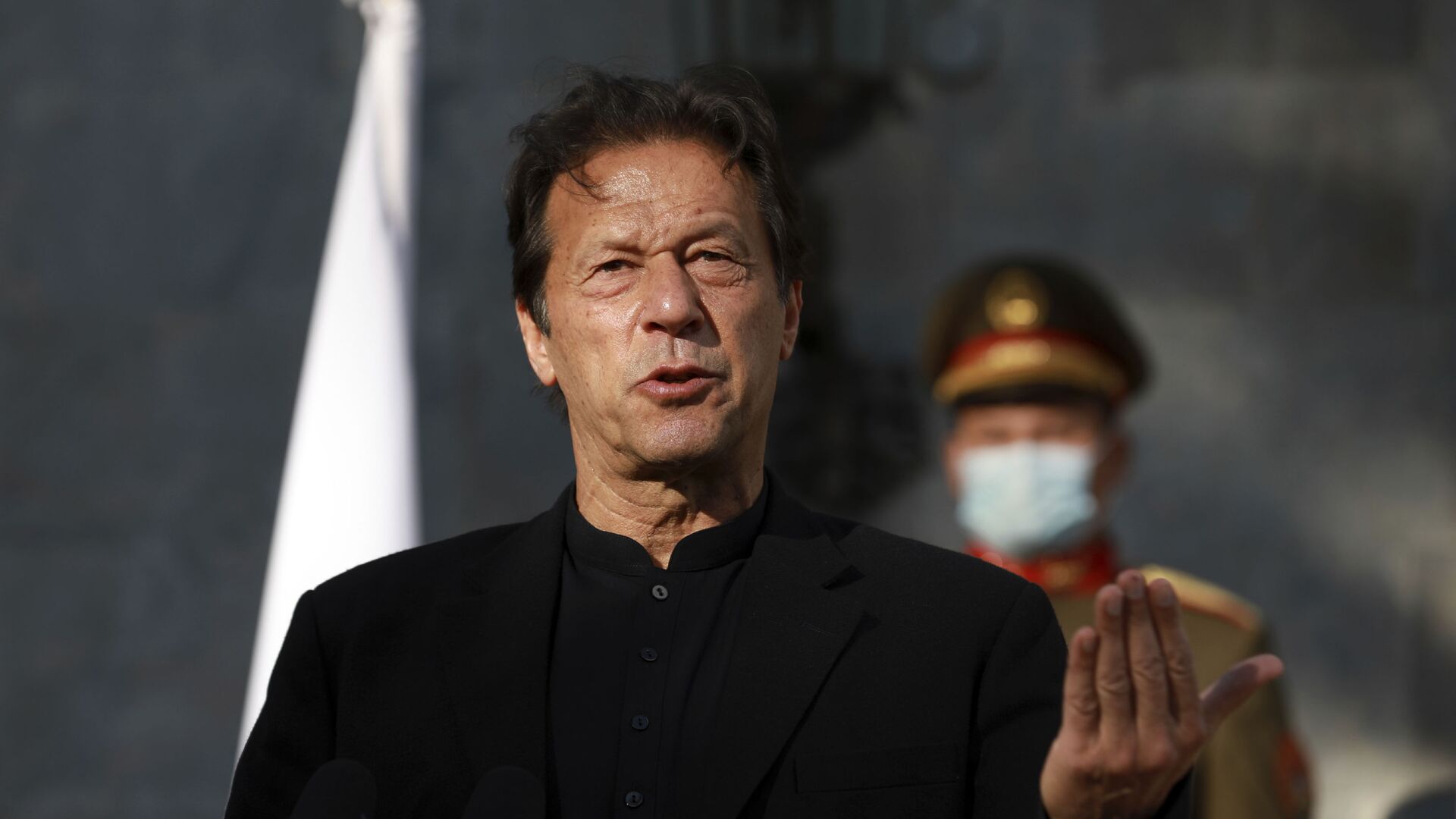https://sputnikglobe.com/20210706/pakistan-pm-downgrades-his-security-detail-as-islamabad-struggles-to-repay-international-debt-1083319915.html
Pakistan PM Downgrades His Security Detail as Islamabad Struggles to Repay International Debt
Pakistan PM Downgrades His Security Detail as Islamabad Struggles to Repay International Debt
Sputnik International
In March, Pakistan entered a $6 billion loan agreement with the International Monetary Fund (IMF) in a bid to provide relief to its ailing economy, which is... 06.07.2021, Sputnik International
2021-07-06T15:35+0000
2021-07-06T15:35+0000
2022-12-08T18:01+0000
asia
world
newsfeed
imran khan
international monetary fund
china-pakistan economic corridor (cpec)
china
pakistan
https://cdn1.img.sputnikglobe.com/img/07e5/07/06/1083320150_0:174:3025:1875_1920x0_80_0_0_0f30b8f6654ed33ee883f792f9f2f268.jpg
Pakistan’s Prime Minister Imran Khan on Tuesday said that from now on, he won't be attending any private functions with security and protocol in order to "minimise public expenditure" and avoid public inconvenience. Prime Minister Khan also said that he would implement similar measures for all his Cabinet colleagues, provincial governors, and chiefs belonging to the federally-governing Pakistan Tehreek-e-Insaaf (PTI) party.Khan said that his government will also decide on a “comprehensive policy” on the matter next week.The order comes in the wake of the South Asian nation facing a severe financial crisis, with Khan last month reportedly demanding a year’s extension from China to repay $1 billion it borrowed last year.Beijing reportedly earlier declined to restructure the debt liabilities to the tune of $3 billion that arose from projects linked to the Beijing-backed China-Pakistan Economic Corridor (CPEC).Pakistan also owes nearly $14 billion to the International Monetary Fund (IMF), a slight increase over what it had borrowed from the Bretton Woods Institution by last financial year.Faced with a severe financial crunch, Pakistan this week signed a $4.5 billion loan agreement with the Saudi Arabia-backed Islamic Development Bank (IDB). The borrowed sum will be used to pay for energy imports, including crude oil, refined petroleum products, and liquefied natural gas (LNG), among others, as per an Asia Times report.In recent months, Pakistan also faced countrywide power cuts due to a lack of energy resources, which opposition parties and Khan’s critics blame on the federal government’s “mismanagement” of resources.
china
pakistan
Sputnik International
feedback@sputniknews.com
+74956456601
MIA „Rossiya Segodnya“
2021
News
en_EN
Sputnik International
feedback@sputniknews.com
+74956456601
MIA „Rossiya Segodnya“
Sputnik International
feedback@sputniknews.com
+74956456601
MIA „Rossiya Segodnya“
newsfeed, imran khan, international monetary fund, china-pakistan economic corridor (cpec), china, pakistan
newsfeed, imran khan, international monetary fund, china-pakistan economic corridor (cpec), china, pakistan
Pakistan PM Downgrades His Security Detail as Islamabad Struggles to Repay International Debt
15:35 GMT 06.07.2021 (Updated: 18:01 GMT 08.12.2022) In March, Pakistan entered a $6 billion loan agreement with the International Monetary Fund (IMF) in a bid to provide relief to its ailing economy, which is faced with an unusually high debt-to-GDP ratio. However, Pakistan has complained that the terms attached to the IMF loan are “tough”, as they call for harsh austerity measures.
Pakistan’s Prime Minister Imran Khan on Tuesday said that from now on, he won't be attending any private functions with security and protocol in order to "minimise public expenditure" and avoid public inconvenience.
Prime Minister Khan also said that he would implement similar measures for all his Cabinet colleagues, provincial governors, and chiefs belonging to the federally-governing Pakistan Tehreek-e-Insaaf (PTI) party.
Khan said that his government will also decide on a “comprehensive policy” on the matter next week.
The order comes in the wake of the South Asian nation facing a severe financial crisis, with Khan last month reportedly demanding a year’s extension from China to repay $1 billion it borrowed last year.
Beijing reportedly earlier declined to restructure the debt liabilities to the tune of $3 billion that arose from projects linked to the Beijing-backed
China-Pakistan Economic Corridor (CPEC).
According to the data from State Bank of Pakistan (SBP), Pakistan owed nearly $283 billion to its creditors as of December 2020.The debt to gross domestic product (GDP) ratio of Pakistan is nearly 98 percent.
Pakistan also owes nearly $14 billion to the
International Monetary Fund (IMF), a slight increase over what it had borrowed from the Bretton Woods Institution by last financial year.
Faced with a severe financial crunch, Pakistan this week signed a $4.5 billion loan agreement with the
Saudi Arabia-backed Islamic Development Bank (IDB). The borrowed sum will be used to pay for energy imports, including crude oil, refined petroleum products, and liquefied natural gas (LNG), among others, as per an Asia Times report.
In recent months, Pakistan also faced countrywide power cuts due to a lack of energy resources, which opposition parties and Khan’s critics blame on the federal government’s “mismanagement” of resources.


